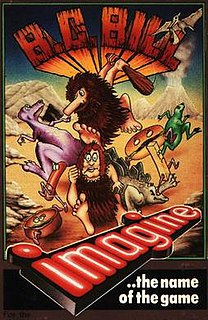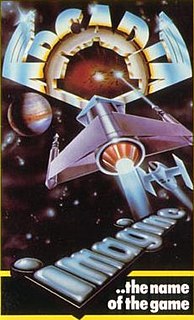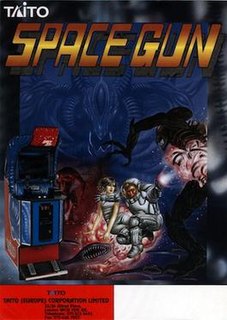Ashby Computers and Graphics Limited, trading as Ultimate Play the Game, was a British video game developer and publisher, founded in 1982, by ex-arcade game developers Tim and Chris Stamper. Ultimate released a series of successful games for the ZX Spectrum, Amstrad CPC, BBC Micro, MSX and Commodore 64 computers from 1983 until its closure in 1988. Ultimate are perhaps best remembered for the big-selling titles Jetpac and Sabre Wulf, each of which sold over 300,000 copies in 1983 and 1984 respectively, and their groundbreaking series of isometric arcade adventures using a technique termed Filmation. Knight Lore, the first of the Filmation games, has been retrospectively described in the press as "seminal ... revolutionary" (GamesTM), "one of the most successful and influential games of all time" (X360), and "probably ... the greatest single advance in the history of computer games" (Edge).

Elite is a space trading video game. It was written and developed by David Braben and Ian Bell and originally published by Acornsoft for the BBC Micro and Acorn Electron computers in September 1984. Elite's open-ended game model and revolutionary 3D graphics led to it being ported to virtually every contemporary home computer system and earned it a place as a classic and a genre maker in gaming history. The game's title derives from one of the player's goals of raising their combat rating to the exalted heights of "Elite".

Sabre Wulf is an action-adventure game released by British video game developer Ultimate Play the Game for the ZX Spectrum home computer in 1984. The player navigates the pith-helmeted Sabreman through a 2D jungle maze while collecting amulet pieces to bypass the guardian at its exit. The player does not receive explicit guidance on how to play and is left to decipher the game's objectives through trial and error. Sabreman moves between the maze's 256 connected screens by touching the border where one screen ends and another begins. Each screen is filled with colourful flora, enemies that spawn at random, and occasional collectibles.

Jetpac is an arcade-style shooter video game developed and published by Ultimate Play the Game and released for the ZX Spectrum and VIC-20 in 1983, and on the BBC Micro in 1984. The game is the first instalment in the Jetman series, and is the first game to be released by the Ultimate company, who were later known as Rare. The game follows Jetman as he must rebuild his rocket in order to explore different planets, while simultaneously defending himself from hostile aliens. Jetpac has since been included in a number of other Rare titles such as an unlockable minigame in 1999's Donkey Kong 64 and part of the 2015 compilation Rare Replay. The game was later included in a game compilation on the ZX Spectrum Vega. It later spawned two direct sequels and a 2007 remake, Jetpac Refuelled, which was released for the Xbox Live Arcade service.

Knight Lore is a 1984 action-adventure game developed and published by Ultimate Play the Game, and written by company founders Chris and Tim Stamper. The game known for its use of isometric graphics, which it further popularized in video games. In Knight Lore, the player character Sabreman has forty days to collect objects throughout a castle and brew a cure to his werewolf curse. Each castle room is depicted in monochrome on its own screen and consists of blocks to climb, obstacles to avoid, and puzzles to solve.
Ocean Software Ltd was a British software development company, that became one of the biggest European video game developers and publishers of the 1980s and 1990s.

Imagine Software was a British video games developer based in Liverpool which existed briefly in the early 1980s, initially producing software for the ZX Spectrum and VIC-20. The company rose quickly to prominence and was noted for its polished, high-budget approach to packaging and advertising, as well as its self-promotion and ambition.

Lunar Jetman is a horizontally scrolling shooter developed and published by Ultimate Play the Game. It was released for the ZX Spectrum in 1983 and later on the BBC Micro. In this sequel to Jetpac, the second installment of the Jetman series, Jetman has to destroy alien bases whilst simultaneously defending himself, along with Earth, from a hostile alien race.

B.C. Bill is a 2D action video game published by Imagine Software in 1984. It was released for the Commodore 64, ZX Spectrum, TRS-80 Color Computer, Dragon 32/64 and BBC Micro.
Crystal Computing, later renamed Design Design, was a British video game developer founded in 1982 by Chris Clarke and Ian Stamp while students at the University of Manchester. Graham Stafford, Neil Mottershead, Simon Brattel and Martin Horsley, joined the company as it expanded. The company's first software release was a compilation of games for the Sinclair ZX81, though it was with the ZX Spectrum that Crystal found its greatest success. A deal with the machine's manufacturer Sinclair to distribute Crystal's Zeus Assembler gave the company sufficient funds for a major marketing campaign for their next product, Halls of the Things, an arcade adventure game that became their most successful title.

Arcadia is a 1983 fixed shooter published by Imagine Software on the ZX Spectrum and Commodore VIC-20. It was later ported to the Commodore 64 and Dragon 32.

Codename MAT is a video game published in 1984 by Micromega for the ZX Spectrum and Amstrad CPC. It was written by Derek Brewster.

Space Gun is a 1990 first-person shooter arcade game released by Taito. The game is set aboard a crippled space station that has been overrun by hostile alien creatures. The objective is to rescue human crew members while destroying the alien creatures. The game lets the player shoot limbs off the creatures, resulting in blood splatters.
Personal Software Services (PSS) was a British software company based in Coventry, founded by Gary Mays and Richard Cockayne in 1981. The company was acquired by Mirrorsoft in 1987. PSS produced video games for the ZX Spectrum, Commodore 64, Amiga, Atari ST, Atari 8-bit family, Amstrad CPC, Oric and IBM PC compatibles.

Silicon Dreams is a trilogy of interactive fiction games developed by Level 9 Computing during the 1980s. The first game was Snowball, released during 1983, followed a year later by Return to Eden, and then by The Worm in Paradise during 1985. The next year they were vended together as the first, second and last of the Silicon Dreams. Early advertisements gave it the title of Silicon Dream, but it was pluralised later.

Cosmic Guerilla is a fixed shooter developed by Universal, the company that would later create Mr. Do!, and released in arcades in 1979. A ZX Spectrum port was published by Crystal Computing in 1983.

Zip Zap is an action game developed by Ian Weatherburn for Imagine Software and released for the ZX Spectrum in 1983.

Automonopoli, also known as Go to Jail, is an unauthorised computer version of the boardgame Monopoly, released in June 1983 by Automata UK for the ZX Spectrum. Although other two-player Monopoly computer programs already existed, the developer advertised that their Automonopoli was the first with an artificial intelligence strong enough to compete against and defeat human players.

Alien is a 1984 hybrid strategy/adventure video game developed by Concept Software and published by Argus Press Software for the Commodore 64 and ZX Spectrum, and later ported for the Amstrad CPC in 1985. It is based on the science fiction horror film Alien.














